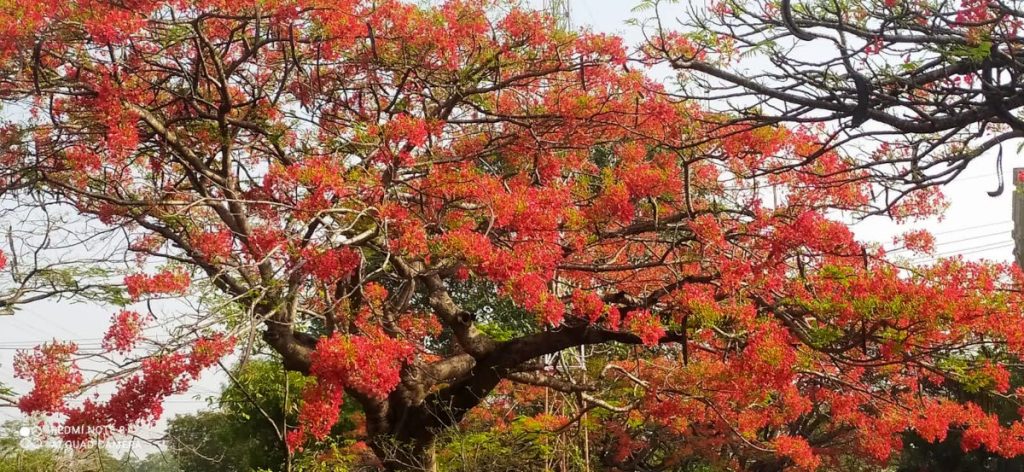Ragini De / Pakhi

The ongoing climate crisis reminded me of a ballet performance in which I participated a few years ago. I was a member of a troupe of dancers from the School of Russian Classical Ballet, New Delhi, that performed to the music of the well-known Italian composer Antonio Vivaldi’s Four Seasons. The Four Seasons, a group of four violin concertos composed around 1718–1720, gives musical expression to the unique essence and distinct nature of each season of the year. Vivaldi captures the beauty and spirit of winter, spring, summer, and autumn through four concertos: ‘Spring’, ‘Summer’, ‘Autumn’, and ‘Winter’.
Our choreography sought to depict the uniqueness of each of the four seasons of the year through physical movement, just as Vivaldi has expressed their essence through music. Our performance tried to capture the vibrancy and elan of the composer’s melodies through ballet, translating the many moods of nature through physicality—the awakening of the natural world in spring from dormancy after a long winter, the joy of a warm and lazy summer, the cool breeze and golden hues of autumn and the delights of an abundant harvest, and the crisp cool days of winter and the freshness of snow.
We, the ballerinas, drew the audience into another world, taking them on a journey of experiencing the changing seasons—depicting the chill of winter, the newness of spring, the stillness of summer, and the melancholy of autumn.
This lyrical passage in ‘Spring’ describes the promise of new beginnings, of the earth stirring
to life after a quiet winter:
“Springtime is upon us.
The birds celebrate her return with festive song,
and murmuring streams are softly caressed by the breezes.
Thunderstorms, those heralds of Spring, roar, casting their dark mantle over heaven,
Then they die away to silence, and the birds take up their charming songs once more…”
Every season has a charm of its own, as Vivaldi’s music illustrates so brilliantly. But the Four Seasons also makes us wonder whether—and for how long—we will be able to enjoy the changing seasons and their different and varied moods in our own lifetime.
“Beneath the blazing sun’s relentless heat
men and flocks are sweltering,
pines are scorched.
We hear the cuckoo’s voice; then sweet songs of the turtle dove and finch are heard.
Soft breezes stir the air….but threatening north wind sweeps them suddenly aside. The
shepherd trembles, fearful of violent storm and what may lie ahead.”
The passage in ‘Summer’ that originally described a peasant peacefully napping in the afternoon is now syncopated and tense, perhaps a precursor to an anxiety-filled dream in our own time when alarming levels of air pollution, wildfires, heat waves, excessive use of fossil fuels, dumping of industrial wastes, floods and hurricanes, drought, and other disasters have become increasingly common. They are bound to increase in scale, reach, and intensity, ending far more lives, destroying far more livelihoods, and fuelling unprecedented levels of starvation, increased potential for climate-related conflict, displacement, forced migration, and warmer temperatures leading to pandemics—all of which are significantly contributing to poor mental and physical health and well being.
Global warming and climate change will continue to affect the ecology and environment, disproportionately impacting the poor, the marginalised, Indigenous communities, and people living in war zones and conflict areas who are struggling to recover from long histories of colonialism, occupation, extraction and capitalism. There is, therefore, an urgent need to redress ongoing injustices, oppressions, and marginalisations and decolonise climate actions to prevent future harm instead of supporting extractive and polluting industries and military-industrial complexes.
As climate change reshapes the planet’s environmental landscape, so do the traditional seasons of the year. But now the seasons are not the same; neither summer nor winter, nor autumn, nor spring. Urgent action is needed to address these pressing environmental issues, mitigate the impacts of climate change, and prevent further devastation towards a sustainable future for all.
Vivaldi’s Four Seasons presents the occurrence of seasons as a regular and predictable natural phenomenon, one that we can all depend on to take place year after year. But today, we can no longer believe in this steady pattern and regular cycle of seasonal changes that Vivaldi envisioned in the eighteenth century. In our time, the natural world is dying at the hands of greedy and rapacious, and sparrows sing their last desperate, sad melody.
While rehearsing and performing, I recall we asked ourselves: Can Vivaldi’s Four Seasons have the same meaning today as it did in the first half of the eighteenth century? Will it resonate with audiences who are now witnessing the terrible effects of climate change? Nature’s ever-changing moods across the seasons inspired Vivaldi’s music. He evoked winter’s cold, dark days, conjuring up visions of gently floating snowflakes settling silently on trees and roofs. He captured the stirring of new life in spring, when birds perched on tree branches sing sweetly, marking their return home from colder places. He reminded us of summer, with its sunny, warm days and cloudless azure skies. He described autumn as when leaves in shades of yellow, red, brown, and gold fall softly to the ground and when villagers celebrate a bountiful harvest.
Today, more than ever, there is an urgent need to ensure that music never ceases and that nature continues to nurture, comfort, and stimulate us. How do we safeguard nature? How can we stop any further damage to nature so that it inspires us to make more music? How can we build a sustainable, safe, and healthy future for the generations to come so that they, too, can dance to the Four Seasons with passion and joy? Will the Four Seasons continue to spin its magic for listeners today? Will it continue to entrance audiences who face shifting climate patterns?
Can the birds take up their charming songs once more?
Ragini De / Pakhi is a classical ballet dancer and a journalist




